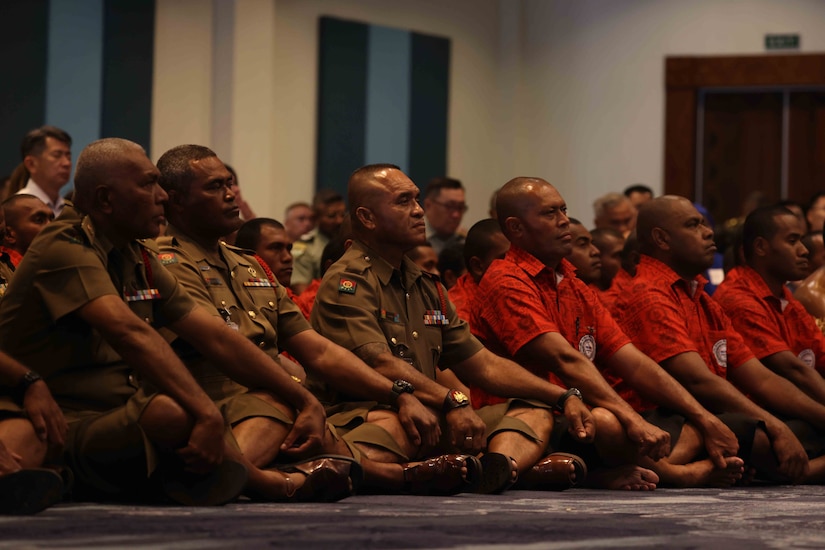Against the backdrop of the scenic Pacific Ocean, and a traditional kava ceremony, the armies of Fiji and the United States kicked off the 48th annual Indo-Pacific Armies Management Seminar and the 10th annual Senior Enlisted in Fiji.
IPAMS is the largest conference for land forces in the region. It is co-hosted by the Fijian Army and United States Army Pacific, attracting senior army leaders from 21 Indo-Pacific countries.
“This seminar serves as a platform for leaders to exchange ideas, share best practices and forge stronger partnerships,” said Fiji Land Commander Brig. Gen. Onisivoro Covunisaqa.
U.S. Army Pacific commander Gen. Charles Flynn echoed those comments saying, “I think the structure that we have in the forums to discuss matters like humanitarian assistance and disaster relief, and the role land forces play in those particular crises, where countries are challenged and people are struggling, is vitally important.”
The theme for this year’s conference is “Joint & Combined Operations in the Indo-Pacific Region.”
Flynn referred to this as a “unity of action,” involving synergistic applications of all partner forces. “What makes this such an achievable goal for this group of land forces, we can achieve unity of action because unlike our adversaries, we share a vision, a common vision, a vision of a free and open Indo-Pacific,” said the U.S. commander.

Conferees participated in plenary sessions, as well as smaller breakout groups. They heard from distinguished guest speakers and participated in lively discussions on topics, such as peacekeeping operations, humanitarian assistance/disaster relief, leadership development and climate change.
Fiji last hosted this conference in 2006, but much has changed in the regional security environment to where both countries say they have improved capability and interoperability thanks to conferences like this.
“In 2006 we were not focused on the collective approach to threats in the Pacific,” said Covunisaqa. “But we are moving towards that now. I’m glad USARPAC has come with us, bringing partners, nations and our forces together to discuss common things during this conference.”
Flynn added, “I have seen at least in the last decade, a substantial increase in all countries wanting to conduct more multilateral activities to bring professional military and, in this case, army forces together to discuss common ways that we can overcome challenges.”
Those challenges said Flynn have been in cyber, transregional crime, human trafficking, illicit activities with fishing and narcotics “and then on top of that you’ve got some major powers and large countries that have lots of capabilities that can be threatening depending on how they’re used.”

Fiji and the U.S. participated in the annual joint exercise “Cartwheel,” named after an actual World War II military operation where both armies collectively helped secure this region. That’s how long both nations have been friends and more importantly reliable partners. “I will tell you with many nations throughout the ‘Blue Pacific,’ the U.S. Army would not have been successful had it not been for local forces being able to partner, demonstrate, assist and enable the U.S. Army to do a range of missions in the region.”
IPAMS is the region’s longest and largest running multinational military seminar promoting security, peace and cooperation in the Indo-Pacific. In 1977, IPAMS started with nine nations attending in Honolulu, Hawaii, and expanded to more than 31 nations attending the conference in Seoul, South Korea in 2018.
This year’s lists included: Australia, Cambodia, Canada, Chile, Fiji, France, Indonesia, Japan, Korea, Malaysia, Maldives, Mongolia, Nepal, New Zealand, Papua New Guinea, Philippines, Singapore, Thailand, Tonga, United Kingdom and Vietnam.
The SELF program was added in 2014, and this year drew the largest number of senior enlisted leaders with 16 participating.
The conference ends today with Malaysia accepting the role as co-hosts of IPAMS, and the much larger bi-annual conference involving chiefs of regional armies.





